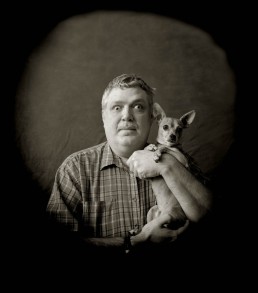S1: Episode 43 - Jimmy Podsim

Episode Information
[Intro Music]
Narrator: Welcome to My Heart is Not Blind. Narrative histories about blindness and perception. A traveling exhibition and book published by Trinity University Press, supported by Kronkosky Charitable Foundation, edited and hosted by Michael Nye. Stories are often found, resting along the edges of surprise and revelation. Every person, every place is a map to somewhere else. Episode 43, Jimmy Podsim.
Jimmy: My name is Jimmy. I am 49 years old <dog barking>. Barkley! He’s a sweetheart that’s he’s, he’s about 15 years old. Barkley Chill!
My name is Jimmy. I’m 49 years old. I have a wife and two children. I live about two miles south of Yorktown on a hilltop. My parents live next door to me and my brother Roger, who is also blind, lives next door to them. And then I had a third brother and he was killed in a car accident on his 21st birthday. As a child, I was interested in everything. I couldn’t do <laugh> if I couldn’t do it. I wanted to do it. I wanted to be a truck driver. I wanted to be a policeman. I wanted to be a fireman, just like every little boy.
I don’t remember my parents ever telling me that I couldn’t see like other people. I probably knew that I had eye problems, but I didn’t have nothing to compare it to, so it never was an issue for me. It was just, for me, it was normal. I don’t remember the exact name of the disease that they said I had, but it’s something on the order of Leber congenital amaurosis. I don’t know. It takes about a page to write it out, so I just decided I have it and there’s nothing I can do about it, so I just accepted it.
I don’t really see anything clear. I see lights. I can see shapes or shadows, and I can see reflections. The only visions I can remember seeing like a faces or anything were in my dreams, so I don’t even know if they were real. As far as when I dream, I think I dream like people see, but I don’t know, I think my brain tries to visualize in my dreams what I feel with my hands. Not so much color, but different shades. I really don’t dunno how to describe it. It just looks like a flat moving photograph with sound. All I can say is if I could see in real life what I can see in my dreams, I could probably drive.
Actually, I think my junior high years were the worst time. There was a lot of picking; name calling. People were afraid of me. They did not understand that they could not catch blindness. To them it was a disease and it was catchable and they didn’t want it. Basically, when I was growing up, I had a really phenomenal memory. It I, I would hear something and it was kind of like a photographic memory. If I heard it, I remembered it. And in math, I was good at finding answers to problems, but I couldn’t tell them how I got the answers. It amazed my algebra teacher because he’s just like, I don’t understand how you get these answers. And I tell him, well, I don’t understand how I do it either. I just do it. It’s something that happens.
When I was in high school, I worked with my father in home construction. Then I went to college and I got out and my parents bought a meat processing plant, and for 20 years, I cut meat, I wrapped meat, I ground meat, de-boned meat and loaded it into people’s cars. Sound can be very visual, very, very visual. When I was younger, I used the sound of my walking, bouncing off of items like a wooden fence or a barn or a feed trough. So I knew in my head where things were, and I think that’s why a lot of people tell me they can’t tell that I have a vision problem. Being able to appear like everyone else, that has been very important to me because when you look different, you’re treated different. When people start making decisions, for me that is something that I resent very much. All my life people have wanted to put me over in a corner and say, you’re different. And all my life I’ve fought to say, no, I’m not different. I just do things differently than you do. There’s nothing special one way or another, it’s just different.
[Outro Music]
Host: As a child, I was interested in everything I couldn’t do, says Jimmy, if I couldn’t do it, that’s what I wanted to do. Like any other little boy. Jimmy is married, has two children, grandchildren, and lives in Yorktown, Texas. In high school, he worked for his father in the construction business, worked on roofs, putting up walls, nailing sheetrock. He worked as a technical support agent, giving advice, setting up accounts for an internet service provider. And then when his parents bought a meat processing plant, he worked for them for 20 years. Jimmy said, if I could have my eyesight back today, I wouldn’t want it. I wouldn’t be the person I am today. I would be someone very, very different. In his free time, he talks on his HAM radio. He said, it’s a place where I feel like I belong. I could be talking to someone across the street or someone in a different country. The HAM radio community is comforting and there’s so much to learn from others. Join us next week. I’m Michael Nye. Thank you so much for listening.
